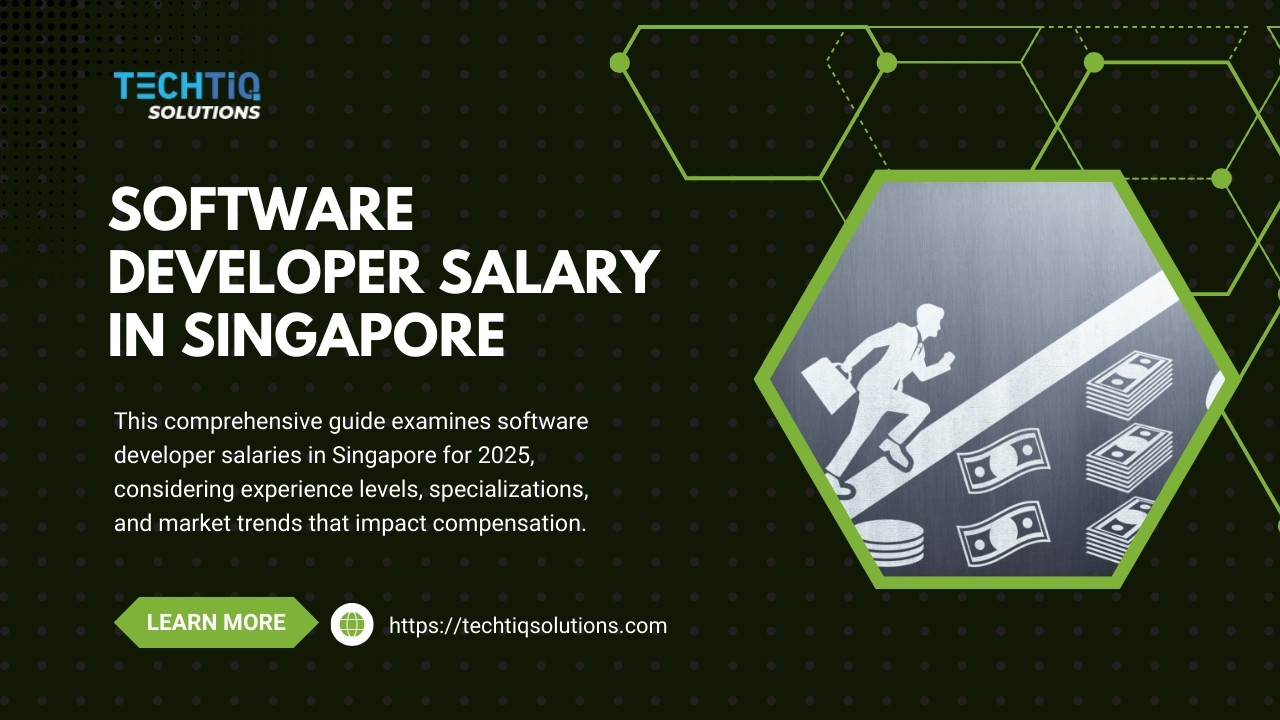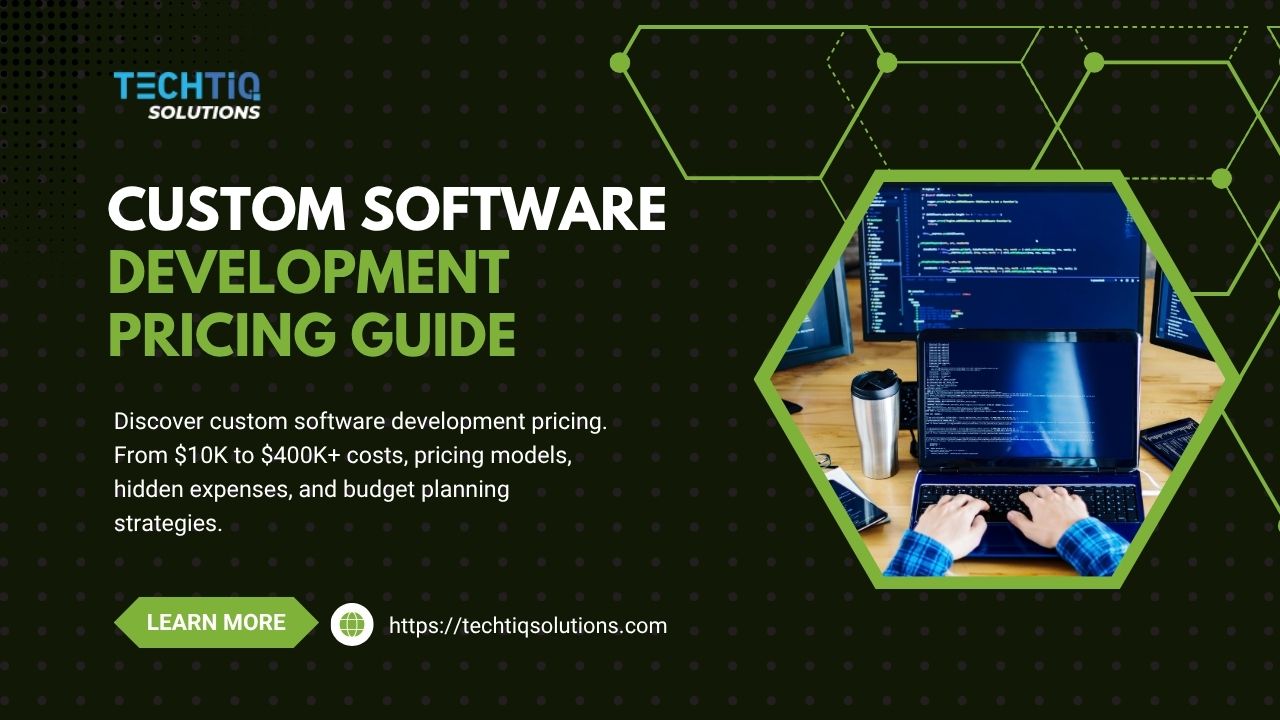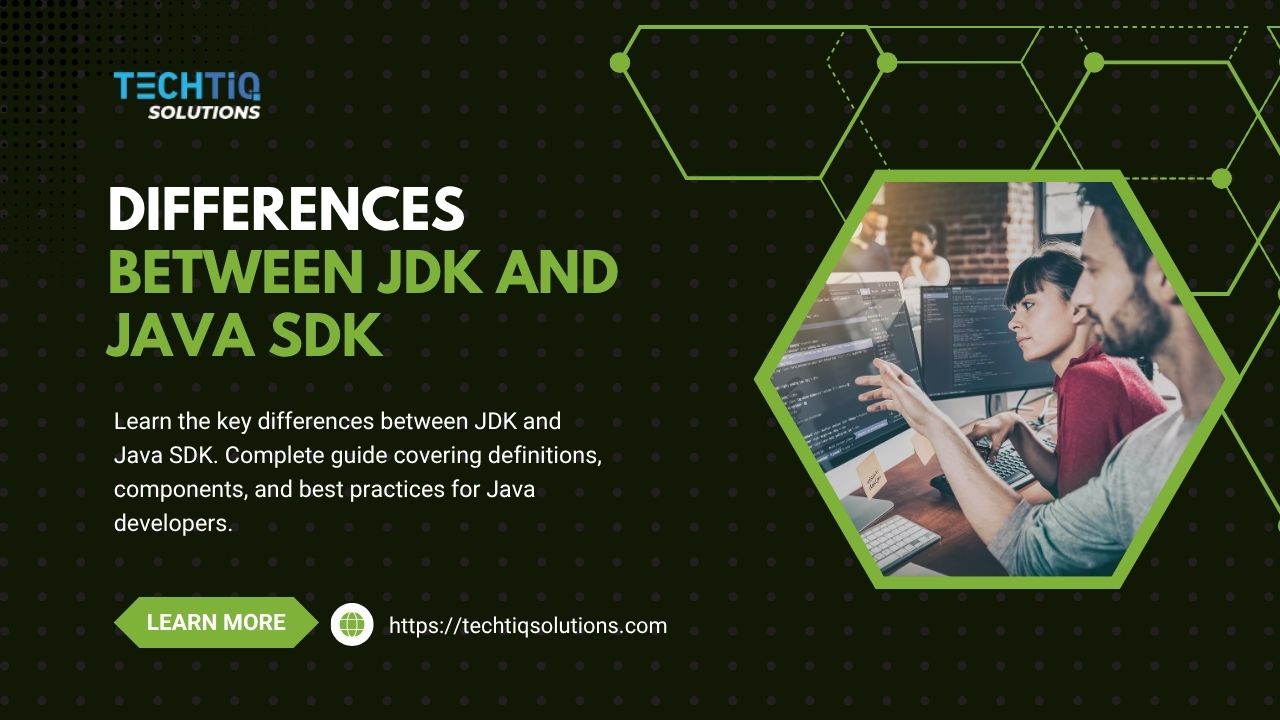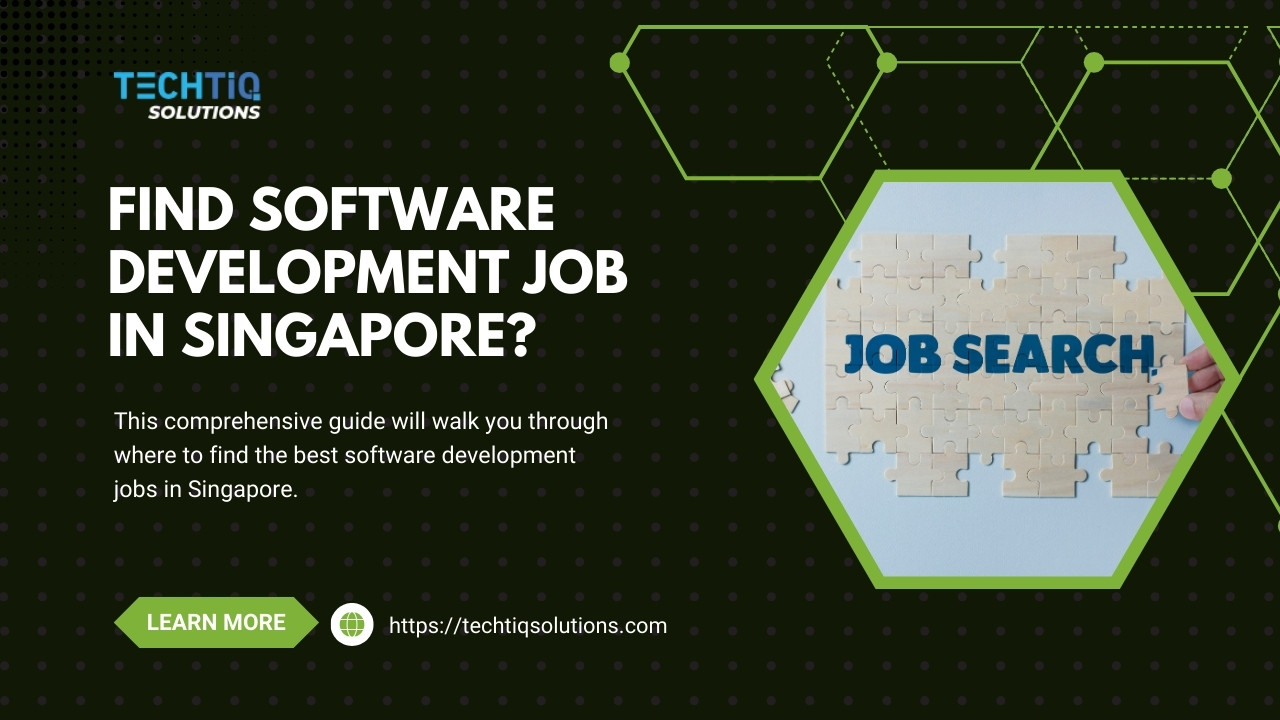In Singapore’s thriving tech ecosystem, software developers remain among the most sought-after professionals. Whether you’re considering a career shift, negotiating a raise, or planning to relocate to this tech hub in Southeast Asia, understanding the salary landscape is crucial.
This comprehensive guide examines software developer salaries in Singapore for 2025, considering experience levels, specializations, and market trends that impact compensation.
Key Takeaways
The average salary for a software developer in Singapore is S$54,806 per year (Source: PayScale), with entry-level positions starting at S$43,815 and experienced professionals earning up to S$176,400
Junior software developers in Singapore can expect starting salaries between S$32,000-S$75,000 annually (Source: PayScale) (approximately S$3,800-S$5,500 monthly)
Mid-level developers with 3-5 years of experience typically earn S$90,960-S$136,440 annually (Source: Jobicy) (S$7,500-S$9,000 monthly (Source: NodeFlair))
Senior developers and tech leads command salaries ranging from S$136,440-S$204,660 annually (Source: Jobicy) (approximately S$11,370-S$17,055 monthly)
Specialized skills in AI/ML, cloud architecture, and cybersecurity can increase earning potential by 15-30%
The Information and Communications Industry Transformation Map projects 80,000 well-paying jobs in the sector by 2025 (Source: Randstad)
Understanding Singapore’s Developer Salary Range in 2025
The software development market in Singapore continues to evolve rapidly, with tech compensation reflecting both global tech trends and local economic factors. Based on current data from March 2025, here’s what software developers can expect:
Entry-Level Software Developer Salaries
Fresh graduates and developers with less than two years of experience typically earn between S$32,000 and S$75,000 per year (Source: PayScale) (approximately S$3,800-S$5,500 monthly), according to PayScale data from March 2025. This range represents a steady increase from previous years, driven by:
High demand for tech talent in Singapore’s digital economy
Competitive recruitment from both local companies and multinational corporations
Rising cost of living in Singapore
Tech education initiatives producing qualified graduates
Entry-level programmer pay can vary significantly based on education, with graduates from top universities or specialized coding bootcamps often commanding higher starting offers. Companies like TechTIQ Solutions provide competitive compensation packages to attract promising junior developers, recognizing the value of fostering talent early.
Mid-Level Developer Compensation
Software developers with 3-5 years of experience can expect annual salaries ranging from S$90,960 to S$136,440 (Source: Jobicy) (approximately S$7,500-S$9,000 monthly (Source: NodeFlair)), according to Jobicy and NodeFlair data from March 2025. At this career stage, compensation differences become more pronounced based on:
Technical specialization and in-demand skills
Project management capabilities
Industry expertise (fintech, healthcare, e-commerce)
Track record of successful implementations
Mid-level developers often see the most significant growth in their coder earnings, particularly those who demonstrate leadership potential alongside technical expertise. This career stage also typically includes more substantial performance bonuses, which can add 10-20% to annual compensation.
Senior Developer and Tech Lead Earnings
Senior developers, architects, and tech leads with 6+ years of experience command substantial developer remuneration between S$136,440 and S$204,660 annually (Source: Jobicy) (approximately S$11,370-S$17,055 monthly), according to Jobicy data from March 2025. PayScale reports that senior software engineers can earn between S$48,000 and S$144,000 per year (Source: PayScale). At this level, compensation packages become increasingly sophisticated, often including:
Competitive base salaries
Performance-based bonuses (15-30% of annual salary)
Stock options or equity grants
Leadership bonuses for team management
Enhanced benefits packages
For those in CTO roles or similar executive positions, compensation can exceed S$20,000 monthly, especially in well-funded startups and established enterprises focused on digital transformation.
Factors Influencing Software Developer Salaries in Singapore
Several key factors determine where a developer falls within these software engineer wages ranges:
Technical Specialization and Skills
In 2025, certain technical skills command premium compensation in Singapore:
|
Specialization |
Salary Range (S$) |
High-Demand Frameworks/Tools |
|
AI/ML Engineering |
90,000-170,000 (Source: Morgan McKinley) |
TensorFlow, PyTorch, Lightning AI |
|
Cloud Architecture |
150,000-200,000 (Source: Morgan McKinley) |
AWS, Google Cloud, Azure, Kubernetes |
|
Java Development |
90,000-150,000 (Source: Morgan McKinley) |
Spring Boot, Hibernate, Microservices |
|
Python |
104,300 average (Source: Jobicy) |
Django, Flask, Data Science libraries |
|
C++ |
90,000-220,000 (Source: Web3 Jobs) |
STL, Boost, Game Engines |
|
Mobile Development |
S$4,800-S$7,300 monthly (Source: JobStreet) |
React Native, Flutter, iOS/Android |
Full-stack developers proficient in multiple domains often earn at the higher end of their experience brackets. Companies like TechTIQ Solutions particularly value developers with diverse skill sets who can contribute across different project areas.
Python developers specializing in data science and machine learning are among the highest paid in the industry, with mid-level Python developers earning between S$122,941 and S$155,230 annually and senior developers earning between S$141,281 and S$177,027 annually (Source: PythonCentral).
Industry Sector
The industry you work in significantly impacts IT professional income:
Financial Services: Banks, insurance companies, and fintech startups typically offer the highest salaries, averaging S$80,000-S$95,000 per year for specialists (Source: ResumeWriter.SG)
Tech: Companies offer monthly salaries ranging from S$3,500 to S$14,700 (Source: NodeFlair)
Healthcare Tech: Growing steadily with competitive compensation, averaging S$4,800-S$7,300 monthly (Source: JobStreet)
Government/Public Sector: Typically offers more stability but often 5-10% below private sector rates
Education/Non-profit: Generally pays less but may offer better work-life balance
TechTIQ Solutions has observed that developers with experience across multiple industries often have stronger negotiating positions, as they bring valuable domain knowledge alongside technical skills.
Company Size and Type
Compensation structures vary significantly based on employer type:
Multinational Corporations: Offer high base salaries, structured advancement, and comprehensive benefits
Local Enterprises: Competitive but generally lower base salaries, sometimes offset by better bonuses
Startups: While once known for lower base salaries, current data suggests startups in Singapore offer similar salary ranges of S$3,500-S$14,700 monthly as MNCs
Government-Linked Companies: Balanced compensation with strong benefits and stability
Top-paying companies for software engineers in Singapore include Facebook, Grab, and OKX, according to Levels.fyi data from March 2025.
Comprehensive understanding of the tech talent compensation landscape helps both job seekers and employers make informed decisions in Singapore’s competitive market.
Education and Certifications
While experience typically outweighs formal education for experienced developers, credentials still impact salary:
Advanced degrees (Master’s, PhD) in computer science or related fields can add 5-15% to compensation
Industry certifications (AWS, Google Cloud, security credentials) increasingly influence salary offers
Specialized bootcamp graduates with strong portfolios can match university graduate salaries after demonstrating skills
Many Singapore employers, including TechTIQ Solutions, value continuous learning and offer education stipends or sponsored certification programs as part of their benefits packages.
Long-term career planning is essential for maximizing your programming career earnings over time. This includes strategic job changes, continuous skill development, and understanding how specialization affects compensation.
Trending Technologies and Their Impact on Salaries
The technologies you specialize in significantly impact earning potential. Based on TechTIQ’s industry experience and current market trends, these technologies are commanding salary premiums in Singapore for 2025:
Artificial Intelligence and Machine Learning
Developers with expertise in AI/ML frameworks like TensorFlow, PyTorch, and specialized knowledge in areas like computer vision, natural language processing, or recommendation systems command some of the highest premiums in the market. According to Morgan McKinley’s 2025 salary guide, AI/ML engineers in Singapore earn between S$90,000 and S$170,000 annually (Source: Morgan McKinley), with monthly salaries for machine learning engineers ranging from S$102,600 to S$132,600 (Source: JobStreet).
Case Study: TechTIQ’s AI Implementation
TechTIQ Solutions developed an AI-powered “Skin Analyzing System” for a healthcare technology client. This project required specialized developers with experience in computer vision, deep learning, and healthcare technology integration. The project showcased the value of specialized AI skills in the Singapore tech market, utilizing PyTorch, ONNX, and custom computer vision algorithms to create an innovative healthcare solution.
Cloud Computing and DevOps
Cloud expertise continues to be in high demand, with professionals skilled in AWS, Google Cloud, and Azure architectures earning between S$150,000 and S$200,000 annually, according to Morgan McKinley’s 2025 salary guide (Source: Morgan McKinley). Monthly salaries for cloud engineers range from S$68,400 to S$82,800, according to JobStreet data from March 2025 (Source: JobStreet).
Kubernetes expertise, in particular, commands a significant premium in Singapore, with certified Kubernetes administrators and developers earning 15-20% above their peers with similar experience levels.
Full-Stack Development
Full-stack developers remain highly employable, especially those proficient in modern JavaScript frameworks (React, Angular, Vue.js) combined with backend skills. Those who can architect complete solutions while understanding performance optimization across the stack are particularly valuable.
Mobile Development
Native iOS and Android development skills continue to command strong salaries, but cross-platform framework expertise (React Native, Flutter) is increasingly valued for its efficiency and reach. Mobile developers who understand the complete app lifecycle, from design to deployment and maintenance, earn at the upper end of the range.
Case Study: TechTIQ’s Mobile App Development
For the “Idealpos” project, TechTIQ Solutions developed a handheld app for Apple devices that allows staff to provide better customer service. This project required developers skilled in React Native, Redux, React Navigation, and socket programming for server connectivity. The specialized mobile development expertise demonstrated in this project highlights the premium value placed on cross-platform mobile development skills in Singapore’s tech ecosystem.
Comparing Software Developer Salaries Across Company Sizes
Compensation structures can vary significantly across different types of employers. According to current data, the salary range for software developers in both startups and multinational corporations (MNCs) appears to be similar, ranging from S$3,500 to S$14,700 per month (Source: NodeFlair).
Startups and Small Companies (Under 50 Employees)
Junior Developer: S$3,800-S$5,000 monthly
Mid-Level Developer: S$5,500-S$8,000 monthly
Senior Developer: S$8,000-S$12,000 monthly
Smaller companies typically offer lower base salaries but may compensate with equity, flexible working arrangements, or accelerated career growth. They often provide greater responsibility earlier in one’s career, which can lead to faster skill development and subsequent salary growth.
Mid-Size Companies (50-500 Employees)
Junior Developer: S$4,200-S$5,500 monthly
Mid-Level Developer: S$6,000-S$9,000 monthly
Senior Developer: S$9,000-S$15,000 monthly
Mid-sized companies often strike a balance between competitive salaries and growth opportunities. Many of Singapore’s growing technology firms fall into this category, offering good compensation with the potential for significant increases as the company scales.
Large Enterprises (500+ Employees)
Junior Developer: S$4,500-S$6,000 monthly
Mid-Level Developer: S$7,000-S$10,000 monthly
Senior Developer: S$10,000-S$18,000+ monthly
Large organizations typically offer the highest base salaries along with structured benefits and bonus programs. They also tend to provide clearer career progression paths, though advancement may be more gradual than in smaller organizations.
Beyond Base Salary: The Complete Compensation Package
In Singapore’s competitive tech market, compensation extends well beyond base salary. When evaluating offers, consider these additional components that make up total Lion City developer pay:
Performance Bonuses
Annual bonuses range widely but typically follow these patterns:
Startups: 0-10% of annual salary, sometimes equity-based
Mid-size companies: 10-20% of annual salary
Large enterprises: 15-30% of annual salary
Financial institutions: Can reach 30-50% for senior roles
Stock Options and Equity
Equity compensation is increasingly common, particularly in:
Startups offering Employee Stock Ownership Plans (ESOPs)
Tech multinationals providing Restricted Stock Units (RSUs)
Financial technology companies with performance-based equity grants
The equity portion of code specialists compensation varies dramatically but can significantly enhance overall earnings, especially in high-growth companies.
Benefits and Allowances
Standard benefits in Singapore’s tech sector typically include:
Healthcare: Comprehensive medical, dental, and vision insurance coverage for the employee and their family
Retirement contributions (CPF plus potential employer matching)
Annual leave (starting at 14-18 days, increasing with seniority)
Training and development allowances
Flexible or remote work options
Transportation or housing allowances (less common but available in some companies)
According to Jobicy’s 2025 data, software developers in Singapore often receive comprehensive benefits packages including healthcare coverage, annual performance-based bonuses, and equity compensation based on local market standards and company policy (Source: Jobicy).
TechTIQ Solutions, for example, offers comprehensive benefits packages that include health insurance, professional development budgets, and flexible working arrangements to attract top development talent.
Understanding current Singapore IT sector wages helps when comparing job offers from different companies or evaluating your current compensation package.
Work-Life Balance Considerations
While harder to quantify, work-life balance significantly impacts overall compensation value:
Some roles with higher salaries may involve longer hours or on-call responsibilities
Companies offering true 40-hour workweeks might provide better value despite lower nominal pay
Remote work options can reduce commuting costs and time
Regional Comparison: Singapore versus Other Tech Hubs
To provide context, here’s how Singapore’s software developer salaries compare to other major tech hubs in 2025 (in USD for comparison):
|
City |
Average Annual Salary (USD) |
|
Singapore |
$92,500 |
|
Hong Kong |
$120,000 |
|
Tokyo |
$111,000 |
|
Bangalore |
$128,000 |
Source: BeInCrypto, March 2025
Regional comparisons provide important context for understanding the software talent market rate in Singapore relative to other tech hubs.
While Singapore offers lower absolute salaries compared to Hong Kong and Bangalore, when adjusted for taxes and cost of living, the effective compensation becomes more comparable. Singapore’s additional advantages include:
Lower personal income tax rates
Strong public infrastructure
Strategic location as a gateway to Asian markets
Stable political and economic environment
For a more specific example, let’s compare the total compensation for software engineers at Goldman Sachs and JPMorgan in Singapore and Hong Kong:
|
Country |
Seniority |
GS 2022 TC (USD) |
GS 2023 TC (USD) |
JPM 2022 TC (USD) |
JPM 2023 TC (USD) |
|
Singapore |
Analyst |
55,026 |
– |
61,998 |
75,033 |
|
Associate |
123,911 |
129,265 |
90,138 |
79,613 |
|
|
Vice President |
112,046 |
147,982 |
139,226 |
– |
|
|
Hong Kong |
Analyst |
124,042 |
149,087 |
77,773 |
77,989 |
|
Associate |
213,709 |
249,500 |
99,163 |
– |
|
|
Vice President |
207,500 |
242,772 |
– |
155,790 |
Source: eFinancialCareers, March 2025
This data suggests that software engineers at these firms may earn more in Hong Kong compared to Singapore. However, further analysis is needed to account for factors like cost of living and specific job roles.
Policy Changes and Economic Factors
Several recent policy changes and economic factors have impacted tech industry remuneration in Singapore:
Attracting Top Talent
Singapore aims to attract top-tier professionals with strong credentials and competitive salaries. This is reflected in the following policy changes:
Higher minimum salary thresholds for Employment Pass (EP) and S Pass holders: This is intended to attract highly skilled foreign professionals and ensure fair wages for local workers (Source: PeopleMattersGlobal)
Complementarity Assessment Framework (COMPASS): This points-based system evaluates EP applications based on factors like salary competitiveness, qualifications, workplace diversity, and support for local employment (Source: PeopleMattersGlobal)
Stricter hiring compliance measures: Employers must demonstrate efforts to recruit local professionals before seeking foreign hires (Source: PeopleMattersGlobal)
Understanding how in-demand digital skills compensation is trending helps developers make strategic career decisions about which technologies to master.
Economic and Social Factors
Increased CPF monthly salary ceiling: This aims to boost overall monthly earnings by factoring in higher CPF contributions from employers (Source: QuickHR)
Higher contribution rates for senior workers: This boosts retirement savings for older employees (Source: Pasona)
Growth of the tech sector: The tech sector in Singapore is booming, contributing significantly to the GDP and driving demand for skilled professionals. The government supports this growth through funding and flexible work arrangements (Source: Nucamp)
Demand for specialized skills: Skills in AI, cloud computing, and cybersecurity are in high demand, leading to higher salaries for professionals with these capabilities (Source: Nucamp)
Impact on Salary Negotiations
These policy changes and economic factors influence salary negotiations for software developers in Singapore:
Job changes can lead to salary jumps of 5% to 20%, with specialized fields like AI and data potentially seeing bumps up to 20% (Source: Nucamp)
Companies are increasingly offering competitive packages to retain talent in a tight labor market
Foreign developers need to be aware of the minimum salary requirements for work passes, which can affect negotiation leverage (Source: PeopleMattersGlobal)
The Future of Software Developer Compensation in Singapore
Several trends are likely to shape software developer salaries in Singapore beyond 2025:
Industry Growth and Job Outlook
The future of the tech job market in Singapore looks promising. The Information and Communications Industry Transformation Map projects 80,000 well-paying jobs in the sector by 2025 (Source: Randstad). This growth is driven by factors such as:
Increasing adoption of AI and machine learning
Investments in emerging technologies like quantum computing
Government’s continued support for the tech sector
Growing demand for digital transformation across industries
Web developer earnings in Singapore vary based on specialization, with front-end, back-end, and full-stack developers commanding different salary ranges.
Increasing Specialization
As technology becomes more complex, developers with specialized expertise in emerging fields will command increasing premiums. Areas to watch include:
Quantum computing
Advanced AI and machine learning
Metaverse/AR/VR development
Specialized security domains
The mobile app developer salary trend continues upward as companies increase their focus on mobile-first strategies and customer engagement.
Remote Work Impact
The normalization of remote work has introduced global competition for some roles while creating new opportunities for others:
Increased competition from overseas developers may pressure certain salary brackets
Specialized roles that require local knowledge remain protected
Singapore-based developers can increasingly access global opportunities
Full-stack developer pay tends to be higher than specialized front-end or back-end roles due to the broader skill set required.
Skills-Based Compensation
Companies are moving toward more nuanced compensation models that directly reward specific skills and contributions rather than using broad job titles or experience levels alone. This trend favors developers who continuously update their skills and demonstrate measurable impact.
Understanding the current range of backend engineer compensation helps developers negotiate more effectively when changing jobs or requesting salary adjustments.
TechTIQ’s Approach to Developer Compensation
As a leading software development company in Singapore, TechTIQ Solutions has developed a comprehensive approach to attract and retain top development talent. Their strategy includes:
Competitive base salaries aligned with industry standards
Performance-based bonus structures
Continuous learning opportunities and certification support
Clear career progression paths
Flexible working arrangements
Frontend developer wages have seen steady growth as user experience becomes increasingly important to business success and customer retention.
Case Study: TechTIQ’s Talent Development
For the “Personal Loan Platform” project, TechTIQ Solutions rapidly assembled a team of 20 senior developers within three months.
The increasing adoption of DevOps practices has led to growth in DevOps engineer salary levels, reflecting the critical importance of deployment automation and infrastructure management.
This project involved building numerous sub-products using Domain-Driven Design and microservices architecture across various domains including fraud detection, loan modification, and member portals.
The migration to cloud infrastructure has created strong demand for engineers with corresponding expertise, driving up cloud developer earnings across Singapore’s tech sector.
The team successfully delivered this complex financial platform by establishing accelerated onboarding processes and creating a continuous learning environment to help team members quickly adapt to new technologies. This collaborative approach ensured high employee satisfaction and retention while meeting the client’s demanding project requirements.
Understanding Singapore tech hub compensation trends helps both local and foreign developers make informed career decisions.
Salary Negotiation Strategies for Software Developers
To maximize your earning potential in Singapore’s software development market:
When considering regional opportunities, understanding Asian tech market rates provides valuable context for salary negotiations and relocation decisions.
Research Before Negotiations
Gather salary data from multiple sources (recruitment agencies, online platforms, professional networks)
Understand the specific company’s compensation structure and constraints
Identify the market rate for your exact skill set and experience level
Highlight Specialized Skills
Emphasize skills that align with high-demand areas in Singapore’s tech market:
Experience with specialized frameworks or technologies
Domain knowledge in regulated industries (financial services, healthcare)
Proven ability to lead technical teams or mentor junior developers
Consider the Total Package
Look beyond base salary to evaluate:
Career growth opportunities
Learning and development resources
Work environment and company culture
Stability versus equity potential
Time Your Negotiation Appropriately
Internal raises are typically discussed during annual reviews
The strongest negotiating position is usually when receiving a new job offer
Consider market conditions (hiring freezes versus talent shortages)
Conclusion
Singapore continues to offer attractive compensation for software developers in 2025, with salaries reflecting both global tech trends and local economic factors. To maximize your earning potential:
Singapore’s continued investment in technology and innovation ensures competitive IT compensation for developers with the right skill sets.
Develop expertise in high-demand specializations like AI/ML, cloud architecture, or cybersecurity
Continuously update your skills through formal education and practical projects
Consider the complete compensation package beyond base salary
Build a strong professional network within Singapore’s tech community
Demonstrate business impact beyond technical skills
Whether you’re a junior developer starting your career or a seasoned professional considering your next move, understanding Singapore tech salaries requires analysis of both base compensation and additional benefits.
Ready to Advance Your Software Development Career?
If you’re looking to join a forward-thinking software development company in Singapore that values technical excellence and offers competitive compensation, TechTIQ Solutions might be your next career destination. With over 8 years of expertise and a diverse portfolio of challenging projects across multiple industries, TechTIQ provides an ideal environment for growth.
For businesses seeking to build software development teams with the right talent at competitive market rates, TechTIQ Solutions offers comprehensive IT staffing and tailored business solutions designed to address your unique challenges and requirements.
Get in touch with TechTIQ Solutions today:
Email: inquiry@techtiqsolutions.com
Phone: (+65) 8898 2997
Address: 28 Sin Ming Lane #02-145, Midview city, Singapore 573972
Frequently Asked Questions
What is the average salary range for software developers in Singapore?
The average salary for software developers in Singapore ranges from S$54,806 per year for general software developers to over S$170,000 for specialized roles in AI/ML or cloud computing. Entry-level positions typically start at S$43,815, while experienced professionals can earn up to S$176,400 annually.
How do software developer salaries in Singapore compare to other Asian tech hubs?
Singapore offers competitive compensation compared to other Asian tech hubs, with average annual salaries around $92,500 USD. While this is lower than Hong Kong ($120,000) and Bangalore ($128,000), Singapore offers advantages like lower tax rates, excellent infrastructure, and a stable business environment that enhance the overall value proposition.
Which programming languages command the highest salaries in Singapore?
Python developers specializing in data science and machine learning tend to earn the highest salaries, with senior developers earning between S$141,281 and S$177,027 annually. C++ developers can earn up to S$220,000, while Java developers typically earn between S$90,000 and S$150,000 annually.
How do recent policy changes affect software developer salaries in Singapore?
Recent policy changes like higher minimum salary thresholds for Employment Passes, the COMPASS framework, and increased CPF contributions have generally pushed salaries upward, especially for foreign talent. These policies aim to attract highly skilled professionals while ensuring competitive compensation for local developers.
What benefits typically accompany software developer salaries in Singapore?
Beyond base salary, software developers in Singapore typically receive comprehensive healthcare coverage, annual performance bonuses (10-30% of salary), retirement contributions, professional development allowances, and sometimes equity compensation. Many companies also offer flexible work arrangements and additional leave days based on tenure.
Sources
Average Software Developer Salary in Singapore – Payscale, March 2025
Software Engineer Salary in Singapore – NodeFlair, March 2025
Software Developer Salary – JobStreet, March 2025
Software Engineer Salary in Singapore – Levels.fyi, March 2025
Software Developer Salary in Singapore 2025 – Jobicy, March 2025
Junior Software Engineer Salary in Singapore – PayScale, March 2025
Average Senior Software Engineer Salary in Singapore – Payscale, March 2025
Software Developer in Asia Salary – BeInCrypto, March 2025
Singapore & Hong Kong tech pay at Goldman & JPMorgan – eFinancialCareers, March 2025
AI/ML Engineer Salaries for Singapore – Morgan McKinley, 2025
Cloud Engineer Salaries for Singapore – Morgan McKinley, 2025
Java Developer Salaries for Singapore – Morgan McKinley, 2025









